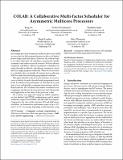COLAB : a collaborative multi-factor scheduler for asymmetric multicore processors
Abstract
Increasingly prevalent asymmetric multicore processors (AMP) are necessary for delivering performance in the era of limited power budget and dark silicon. However, the software fails to use them efficiently. OS schedulers, in particular, handle asymmetry only under restricted scenarios. We have efficient symmetric schedulers, efficient asymmetric schedulers for single-threaded workloads, and efficient asymmetric schedulers for single program workloads. What we do not have is a scheduler that can handle all runtime factors affecting AMP for multi-threaded multi-programmed workloads. This paper introduces the first general purpose asymmetry-aware scheduler for multi-threaded multi-programmed workloads. It estimates the performance of each thread on each type of core and identifies communication patterns and bottleneck threads. The scheduler then makes coordinated core assignment and thread selection decisions that still provide each application its fair share of the processor's time. We evaluate our approach using the GEM5 simulator on four distinct big.LITTLE configurations and 26 mixed workloads composed of PARSEC and SPLASH2 benchmarks. Compared to the state-of-the art Linux CFS and AMP-aware schedulers, we demonstrate performance gains of up to 25% and 5% to 15% on average depending on the hardware setup.
Citation
Yu , T , Petoumenos , P , Janjic , V , Leather , H & Thomson , J D 2020 , COLAB : a collaborative multi-factor scheduler for asymmetric multicore processors . in J Mars , L Tang , J Xue & P Wu (eds) , Proceedings of the 18th ACM/IEEE International Symposium on Code Generation and Optimization (GCO 2020) . International Symposium on Code Generation and Optimization , ACM , New York , pp. 268-279 , International Symposium on Code Generation and Optimization (CGO 2020) , San Diego , California , United States , 22/02/20 . https://doi.org/10.1145/3368826.3377915 conference
Publication
Proceedings of the 18th ACM/IEEE International Symposium on Code Generation and Optimization (GCO 2020)
ISSN
1931-0544Type
Conference item
Description
Funding: Partially funded by the UK EPSRC grants Discovery: Pattern Discovery and Program Shaping for Many-core Systems (EP/P020631/1) and ABC: Adaptive Brokerage for Cloud (EP/R010528/1); Royal Academy of Engineering under the Research Fellowship scheme.Collections
Items in the St Andrews Research Repository are protected by copyright, with all rights reserved, unless otherwise indicated.

